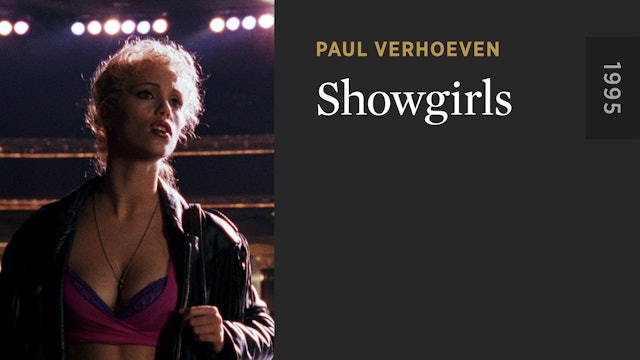I got to this notorious Verhoeven movie after seeing at least 6 other movies of his. So, by this time, I am familiar enough with his internal logic and worldview and no longer have that vague disturbing feeling. While I do not disagree with a lot of the discourse on the movie's themes of misogyny, commodification of the female body, and female rage, I do feel like observers are consistently hampered by their inability to imagine that a male author/creator can project his own self into female characters. The universality of this blind spot is absolutely baffling, as I dare say every female storyteller has tried to write from a male point of view. Is it so hard to imagine that male storytellers would identify with female characters sometimes? George RR Martin mentioned that of course all those female characters came out of his own mind just like the male ones, including Cersei. He had to identify with them to write their POV chapters.
What I mean is, social and gender critiques aside (all valid), Nomi represents a pretty big part of Verhoeven himself.
(If the character were male, this identification would be apparent to everyone immediately.)
Many have observed, and Verhoeven himself also acknowledged, that the character's introduction is more than a little strange. From the start, Nomi is presented as brusque, irritable, and combative. In other words, the audience does not recognize her as a white American woman of a lower class. Her behaviors would be far more understandable and acceptable if they had come from a white Dutch man.
Most of the movie demonstrating Nomi's ambitious but conflicted pursuit of success in Las Vegas is an obvious analogy of Verhoeven's own ambitious and conflicted pursuit of success in Hollywood. Nomi's repeated and earnest insistence that she is not a prostitute is cited by critics as one of the laughable choices of the movie --- and indeed I agree, as she clearly seduced the Kyle McLaughlin character in order to get the understudy role --- I interpret this as Verhoeven's self-mockery of his career in America. Sure, he slipped satire into Total Recall, Robocop, and Basic Instinct, but these movies nevertheless were primarily crowd-pleasing blockbusters that sucked the American audience's collective dick. So I can imagine he felt a little bit conflicted about how much he was prostituting his talent and sensibility for fame and fortune. (I read somewhere that he claimed that he moved to Hollywood because his wife pushed him into it. Regardless of the credibility of his claim [throwing his wife under the bus?], it's an indication of his ambivalence.)
In the past 30 years, I have been to Las Vegas twice, once for a professional conference and the other for a figure skating event. The vulgarity and gaudiness and excess of Vegas are accurately reflected in Showgirls' own style. Besides the vulgarity and naked (no pun intended) greed, I am surprised by a sense of hostility permeating ordinary interactions, even though it is 90% service economy. I repeatedly got ripped off by taxi drivers. Restaurant staff were unfriendly. Unlike rural America, the general indifference and antagonism are not related to race or immigration or the usual political trigger points. People just seem tired and hardened, with no empathy to spare. The only nice and honest taxi driver I met, a middle-aged woman, told me that she was a Los Angeles transplant and contemplating moving back to LA.
In that sense, the Molly character in the movie is almost unrealistically tender and generous. Perhaps it is just Verhoeven's commentary about the general condition of African Americans; I don't know. That element aside, Verhoeven's unapologetic cynicism about human nature (see "Flesh and Blood", 1985) fits perfectly for the setting and makes his observation of Las Vegas and, by proxy, Hollywood totally spot on, especially the bosses, from the strip club owner to the show director to the businessmen, are all as ugly as the decorations of Vegas hotels.
Another complaint in the barrage of critical and pop-culture hatred toward Showgirls at the time was that none of the nudity and sex scenes are titillating or gratifying at all. Again I agree, except that it's not necessarily a bad thing. Everyone knows, and Verhoeven admitted himself, that sex is a central concern in his work, and he wants to examine it whenever he can. And yet, nothing in Showgirls is sexually appealing. Quite the opposite. All the sex and nude scenes are about dominance, and I do mean ALL. There is no warmth or tender feeling in any of them. If we have to dig deeper for feelings, perhaps the intense rivalry between Nomi and Gina Gershon's character contains a hint of mutual attraction, but I don't think it was successfully conveyed.
What is truly impressive and not cynical, however, is the dance choreography. Yes, the nudity could be a little distracting, but once we ignore that part (one gets numb quickly), it becomes clear that the dance scenes were well choreographed, filmed, and edited. Elizabeth Berkley performed her dance sequences with a crazed intensity that no doubt was required by Verhoeven. They were not only set pieces but also character- and plot-driven. In a way, it is a pretty good movie musical, if we ignore the Hollywood tradition of movie musicals as wholesome "family" entertainment.
The movie is a little too long (excess is another Verhoeven trait). About two-thirds way through, I was getting somewhat bored. But the revenge scene near the end, although short, woke me up from the slump. The straight, blond ponytail hairstyle, used ONLY in this scene, suggests an entirely different movie that is more committed to rage, which might be more interesting. It reminds me of an early Verhoeven movie, The Fourth Man (1983).



No comments:
Post a Comment